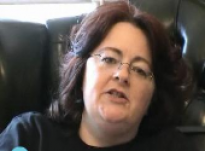Interview 20- Ovarian cancer

Ovarian cancer diagnosed in 2000 following abdominal pain and bloating, painful sex and bleeding afterwards. Treated by surgical removal of tumour, chemotherapy, then removal of ovaries and womb and more chemotherapy. Further surgery to repair a hernia.
Mother, married, one child.
For more clips from this interview click here.
More about me...
When faced with the choice to have a hysterectomy or chemotherapy to treat ovarian cancer doctors were reluctant to direct her in the best treatment. She suspects this was because of the media coverage surrounding the treatment at the time.
When faced with the choice to have a hysterectomy or chemotherapy to treat ovarian cancer doctors were reluctant to direct her in the best treatment. She suspects this was because of the media coverage surrounding the treatment at the time.
The hysterectomy, I remember we were in this room with the surgeon and the oncology team and, because all this happened at the time when there was a lot of news reports and cases brought against gynaecologists, and he was saying about "well this is the chemotherapy you need and, you know, you might want to look at a hysterectomy," but it was the way it's put "you might want to look at a hysterectomy." And then, you know, you dig a big deeper "Okay well what's the best way of walking away from this? So if it's going to be awful and sheer hell for a year as a family, how are we going to, how am I going to create the best chances of us walking away from it all?"
Was surprised when her doctors seemed relieved that she chose to have a hysterectomy after having her ovary and tumour removed and wondered why they had left the choice to her.
Was surprised when her doctors seemed relieved that she chose to have a hysterectomy after having her ovary and tumour removed and wondered why they had left the choice to her.
The hysterectomy, I remember we were in this room with the surgeon and the oncology team and, because all this happened at the time when there was a lot of news reports and cases brought against gynaecologists, and he was saying about "well this is the chemotherapy you need and, you know, you might want to look at a hysterectomy," but it was the way it's put "you might want to look at a hysterectomy." And then, you know, you dig a big deeper "Okay well what's the best way of walking away from this? So if it's going to be awful and sheer hell for a year as a family, how are we going to, how am I going to create the best chances of us walking away from it all?"

